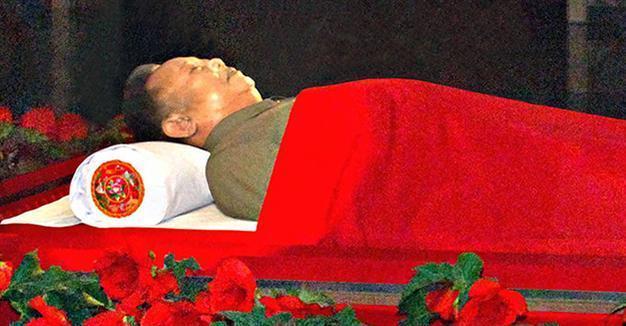Live long and endure: how China's Mao was preserved
BEIJING - Agence France-Presse

AFP photo
Days after Communist China's founding father Mao Zedong died 40 years ago the problem of what to do with his corpse was becoming increasingly heated -- literally.Mao himself had requested cremation, but powerful officials including his mercurial widow Jiang Qing decided he would join the likes of Vladimir Lenin and Ho Chi Minh in being embalmed and put on display.
Before the natural processes of decay could take hold, Xie Piao, an official overseeing an experimental thermoelectric cooling project, was summoned in the middle of the night and tasked with cooling the corpse.
"No one expected that Chairman Mao would die, so there were no preparations at all," said Xie, now 75, who said he then felt "quite proud" to be involved in preserving the Great Helmsman's body.
He arrived at the cavernous Great Hall of the People four decades ago on Sunday to find the prostrate body of the man who led the Communist party to victory, founding the People's Republic before plunging it into chaos, in a hastily-constructed glass and wood coffin, at room temperature beneath hot electric lights.
"Our aim was to get the temperature down to 4 or 5 degrees Celsius (39-41 degrees Fahrenheit)," he told AFP, adding that some 400 people were involved in the entire project.
"We couldn't freeze him - that was his doctors' order," Xie told AFP.
At the time Chinese refrigeration systems were basic. With Soviet relations still on a war footing, asking Moscow for help was unthinkable and its ally Hanoi rebuffed calls from Beijing for assistance, Xie said.
"I thought the technology was very reliable, it was very simple," he said in what is believed to be his first interview with foreign media.
"The fear came later."
Within hours nitrogen gas surrounding the corpse had been bought down to a cool eight degrees Celsius. But that did not prevent Mao's anointed successor Hua Guofeng berating Xie for using "experimental" techniques.
Senior leaders arrived day and night to bow before the body, adding to the seven-strong refrigeration team's tensions.
"Once I was so tired I fell asleep in the middle of work. We had no time to sleep for five, seven days," he said.
Mao's death on September 9 1976 is seen as bringing to an end the destructive decade of "Cultural Revolution" he unleashed on his nation.
But the period's intense political atmosphere still permeated the corridors of the Great Hall.
"It was very serious, no one chatted," Xie said.
When Jiang arrived to pay respects to her husband, Xie hid among the floral tributes for fear of becoming a focus for her notorious temper, according to an account he published for the first time this year.
Eight days after arriving at the Great Hall, Xie's work was declared complete.
He knows little of the embalming, said to have involved draining the corpse of fluids and injecting it with the chemical preservative formaldehyde.
Mao's former doctor Li Zhisui published a ghoulish account of the process, describing the former ruler's head swelling up "like a football".
Xie dismisses it as "unreliable", but whatever the details, Mao was put on permanent display in 1977 in a monumental pillared memorial hall in Beijing's Tiananmen Square.
Mao lies in a dim chamber, garbed in a grey suit, his sallow waxy face framed by thick black hair bathed in a patch of orange light.
With debate about his legacy stifled by Communist authorities, he still retains a powerful hold over some sections of Chinese society and receives hundreds, sometimes thousands of visitors a day.
No detailed official account of the preservation efforts has been published.
The editorial staff of liberal intellectual magazine Yanhuang Chunqiu, or Annals of The Yellow Emperor, was purged in August, shortly after it published Xie's account, in a sign of further tightening under current President Xi Jinping.
Xie, the son of a first generation Communist who himself suffered in the Cultural Revolution, only visited the corpse once again -- in the 1980s -- and said he was "too busy" to pay any respects this week.
Top leaders also stayed away.
While still celebrating Mao, the ruling party has acknowledged the "gross mistakes" of a man whose Great Leap Forward resulted in a famine which killed tens of millions of people in the early 1960s.
Intellectuals have periodically called for his body's removal from the square.
But Xie said: "Although there is controversy, I think that Mao's corpse has been somewhat useful to China over the decades.
















